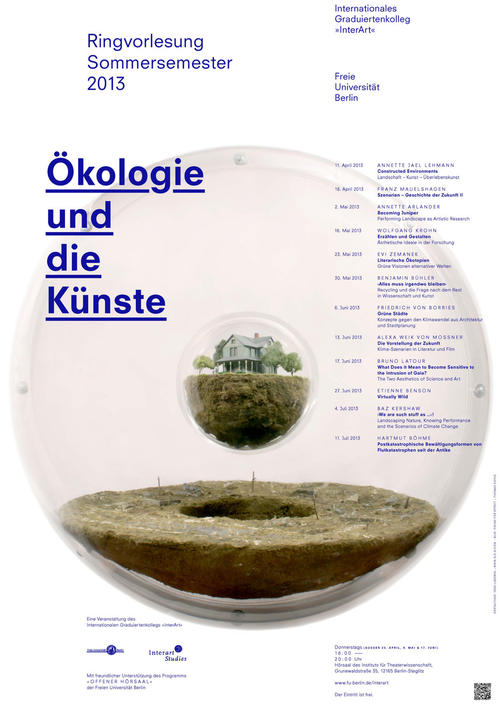Ecology and the Arts
Lecture Series
Summer Term 2013
organised by the International Research Training Group »Interart-Studies«
Freie Universität Berlin
This lecture series sets out to explore the relations between ecology and the arts by examining from an interdisciplinary perspective the strategies and forms in which ecological issues are raised, discussed, interrogated, and performed in the arts. In which ways do nature(s) or environment(s) become topics of artistic exploration? What does it mean when artists deal and engage with pressing ecological problems and questions that contemporary societies are faced with? Is this just a continuation of an ecological discourse by other means? Which concepts of nature and of environment come into play when approaching the relation of ecology and the arts? And how to conceptualize an ecological aesthetics?
When artists like Olafur Eliasson in his photo series »Melting Ice on Gunnar's Land« (2008) captures the melting of a block of ice amidst an Icelandic landscape, or like the director Christoph Marthaler exhibits a slowly dissolving block of ice as a transitory sculpture on the occasion of his 2011 performance »±0 Ein subpolares Basislager« at the Volksbühne Berlin, these works cannot only be conceived of as artistic projects that seek to make the ephemeral and elemental of nature's phenomena visible. As interventions into (urban) landscapes they can also be interpreted as creating a link of art to nature(s) as much as commenting on the relations of humans and their environment.
The interest in tackling the relations of ecology and the arts within this lecture series, on the one hand, derives from the observation of a wide range of artistic projects since the second half of the 20th century that are either directly connected to the emergence of ecological movements and activism or that are dealing with ecological and environmental issues in a broader sense, regarding the shaping and performing of urban and non-urban spaces, the relation of humans and animals or exploring the environment's materiality. On the other hand, poststructuralist approaches as well as studies in the field of the knowledge of history have opened up new perspectives of conceptualizing ecology not solely as environment protection, but rather as a knowledge on the processes of mutual exchange between cultural (human) and natural (non-human) systems.
Against this backdrop, the lecture series seeks to examine the relations of ecology and the arts – without assuming a dualism between nature and culture, but complex processes of dynamic interweaving – and focuses on three major aspects: (1) Landscape/Performance; (2) Nature/Knowledge, and (3) Climate/Scenario.


